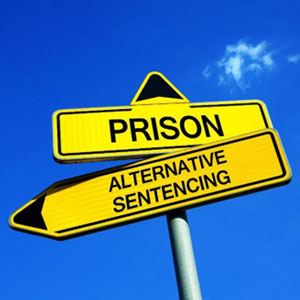 Alternative Sentencing In A Criminal Case
Alternative Sentencing In A Criminal Case
In Los Angeles County, community labor often serves as a substitute for confinement. You’ve probably seen people on the side of the freeway doing things like picking up trash. These people are typically part of a program like this that is an alternative to jail. Participants gather at a designated location downtown, where those overseeing the program select a group to perform hard labor for approximately eight hours, the equivalent of a full day of jail time.
Another option is community service, often referred to as soft labor. This involves activities such as volunteering at a soup kitchen or helping clean up a church — volunteer work that doesn’t necessarily involve labor under the direction of the city. However, with soft labor, 10 hours generally equals a full day, and not every defendant qualifies for this option. It’s a better alternative from a work perspective compared to hard labor, but you will need to commit more time to fulfill your sentence.
It’s important you consider the concept of good time and work time when exploring jail alternatives such as soft- or hard- labor. While you will receive good time/work time credit for time served in custody, completing hard- or soft- labor means fulfilling the required number of days in custody in a one-to-one ratio. For instance, if you were sentenced to 30-days jail in Los Angeles County, you can expect to be in custody for 15 days, and earn 15 days of credit for “good time/work time”. However, if you are allowed to chose a hard-labor alternative, you’ll have to perform 30 8-hour days of hard labor, or 240 hours. If you are allowed soft labor, you’ll have to perform 30 10-hour days, or 300 hours. You should bear this in mind when making your decision regarding any alternative to jail time.
Depending on the nature of your offense, you might be eligible for drug court. This involves regular court appearances and frequent drug testing to “earn” a dismissal. Deferred entry of judgment programs follows a similar structure, requiring completion of all stipulated tasks, after which your judgment is never entered, and you earn a dismissal.
For cases involving mental health issues, there’s a mental health diversion program that entails attending therapy for an extended period. Similarly, various drug diversion programs involve counseling and regular drug testing. Successful completion of these requirements results in earning a dismissal. When feasible, pursuing diversion programs is wise, providing an opportunity to resolve legal matters while addressing underlying issues.
Diversion
Diversion has its merits, but it isn’t necessarily the best path for everyone. Typically, diversion programs are offered to people who just need a chance to redirect their lives in a positive direction. By this, I mean that it’s essentially an opportunity to make amends and move away from negative aspects of your life.
In cases of drug or mental health diversion, for instance, you might have committed a crime related to substance abuse, and you’re genuinely ready to put an end to that destructive behavior. The court takes this commitment of no longer engaging in such activities seriously. If you prove your sincerity by completing all required tasks, such as attending drug counseling and undergoing drug tests, the court will dismiss your case.
So, if you are willing to put in the effort, diversion is the way to go. However, if you are not prepared to commit to the required work, then you might have to follow the standard legal process, potentially facing sentencing or conviction for a crime that could have been eligible for diversion.
Immediately Pleading Guilty
It’s never a good idea to plead guilty to a crime right off the bat. Pleading guilty without exploring your legal options can lead to missed opportunities for case dismissal or obtaining a more favorable deal. Even if your intention is to ultimately plead guilty, you should have an attorney review your case to assess the potential for dismissal or reduced charges. A skilled attorney can provide valuable insights into the optimal strategy for pleading guilty and the potential sentencing outcomes you may face.
While some might consider representing themselves, the risks often outweigh the benefits by far. People who navigate the legal process without legal representation, either by rejecting the public defender or forgoing a private attorney, may end up with less favorable outcomes. Spending a bit of time consulting with a public defender or investing in a private attorney, even for as short as 20 minutes, can result in significantly better results.
I always advise individuals to hire an attorney if they can afford one. While public defenders can be a valuable resource, those with the financial means to hire a private attorney often find it more convenient and effective. Private attorneys are generally more accessible, willing to spend time explaining the legal situation you face to you, and can offer personalized guidance tailored to your specific case. Investing in a good attorney can save not only money in the long run but also potentially spare you from jail time, community service, or community labor.
Yet, if your financial situation is limited such that you can’t hire an attorney, at the very least, being patient with a public defender and spending 20 minutes or so discussing the case can yield clear and significant benefits. Those brief consultations may uncover insights that have the potential to save time and money, as well as mitigate legal consequences.
For more information on Alternative Sentencing In A Criminal Case, a free initial consultation is your next best step. Get the information and legal answers you are seeking by calling (310) 4159-499 today.